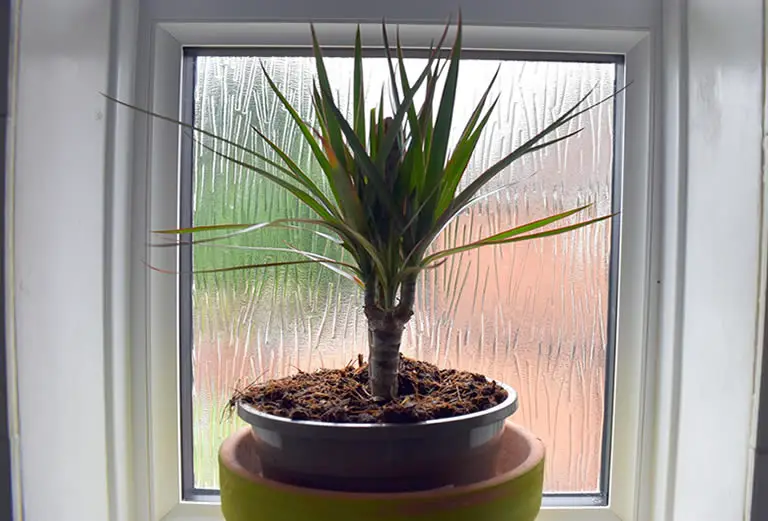Dracaena plants are perennial succulent tress and shrubs. They are mostly grown as houseplants, mainly due their tropical nature which makes them unsuitable for outdoor use in most US locations.
Because dracaena are grown as houseplants they are easily accessible to curious members of the household, whether they be furless or furry, who may want to nibble on the foliage.
In this article I will address potential issues associated with ingesting dracaena that may occur when keeping dracaena plants in the home.
Table of Contents
- Is Dracaena A Poisonous Plant?
- The toxicity of dracaena plants
- Dracaena plants are not poisonous to humans
- The toxic relationship between cats and dracaena
- The toxic relationship between dogs and dracaena
- Dracaena is not toxic to rabbits but too much isn’t good for them
- Birds can happily eat dracaena
- Reptiles suffer no ill effects from munching on dracaena
- The lemon lime plant is poisonous to some species
Is Dracaena A Poisonous Plant?
You will find information in this article information detailing the toxicity of dracaena as it relates to both humans and animals.
Obviously not all animals are the same and what is poisonous to one animal may be completely harmless to another.
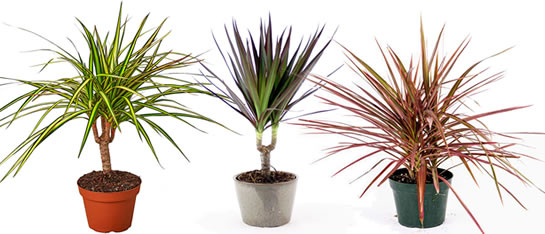
So, I have endeavored to cover as many common pets as I can in the guide as well as covering the side effects a child may experience after eating dracaena leaves.
The toxicity of dracaena plants
So just how poisonous are dracaena plants?
Dracaena plants are toxic to some common pets, such as cats and dogs, causing varying degrees of illness.
Dracaena is fatally toxic to horses.
These plants can upset the stomachs of rabbits if consumed in large quantities.
They are non-toxic to birds and reptiles and are also non-toxic to humans.
Ingesting dracaena has varying side-effects on the type of animal that ingests it.
By far the worst effects dracaena plants can have on commonly kept animals, is on horses.
All species of dracaena and all parts of the plant are lethal to horses and other equines.
A horse should never be fed dracaena.
Fortunately the plant is very unpalatable and hard to digest for equines so it is very rare that an equine would feed on it unless it was desperately hungry with no other food source available.
Dracaena plants are not poisonous to humans
As dracaena are a genus of plant consisting of 120 different flowering succulent tress and shrubs many dracaena owners wonder if all species of dracaena plants are non-poisonous to humans.
All species of dracaena plants are non-poisonous to humans.
They are therefore safe to grow around children.
Be aware though they they are poisonous to some pets.
As you can see, dracaena plants are perfectly safe for growing in a home with little curious children, who may be tempted to taste the foliage of the plant.
All types of dracaena, including the dragon tree are not poisonous to humans.
Children who nibble on dracaena leaves will suffer no ill effects from the experience.
Pets may not be as fortunate however.
For example, we outlined in the article, are dragon trees toxic to pets just how dangerous is it for certain animals to eat these dracaena plants.
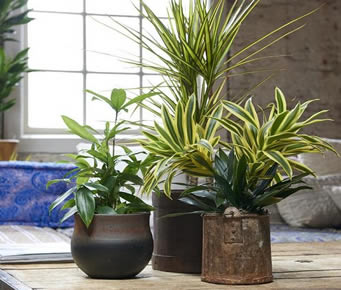
Pets are very common companions for humans. Because different pets have different digestive systems, and will often react to substances differently, it is important to know which plants are potentially harmful to your pet.
See our pet plant allergy guide for examples.
So let’s now look at what can happen to some common pets if they eat dracaena.
The toxic relationship between cats and dracaena
I will begin our look at pets and how they react to eating dracaena by first addressing the question of how poisonous dracaena is to cats (because I live with some).
Are dracaena toxic to cats?
Dracaena is toxic to cats. Though it is rarely fatal it does cause some serious symptoms.
Vomiting, lethargy, depression, anxiety along with hypersalivation and loss of appetite are common symptoms and diluted pupils can be a tell-tale sign of emerging problems.
If you are concerned your cat may have eaten dracaena, take it to a vet.
As a cat owner (I have 3 and had 6 at one stage) I am very careful about where I place my dracaena.
I never put dracaena plants (or even dracaena cuttings that I am rooting) in a location that is easily accessible to my feline family members.
However, as cats are excellent explorers, jumpers and can squeeze into impossible tight places, this is often a more difficult task than it sounds.
I actually place my dracaena in an area of my home where my cats have no access to (my home office).
Obviously this solution will not work for every cat owner.
If you have felines that keep an open-roam policy in your home and who are difficult to restrict to certain areas, it is probably best you do not grow dracaena.
If you really want to grow dracaena, or you already own one and have just acquired a cat (or more accurately it just acquired you) then take heart as there is an alternative.
How to keep cats away from dracaena
Dracaena is poisonous to cats so it is important you take action to keep your feline friends away from any dracaena houseplants or dracaena garden plants you own.
How do you keep cats away from dracaena?
To keep cats away from dracaena you can place citrus fruit skin peelings around the pot or even on the soil at the side of the pot (ensure they dry and are juice-free). Cats hate the smell of citrus.
You can also sprinkle small amounts of cayenne pepper on the leaves as this has the same effect.
Spray leaves with oils that are safe for plants and animals also works.
If neither citrus nor cayenne pepper discourage your cat from venturing to the dracaena you can use whatever fragrance your particular cat dislikes.
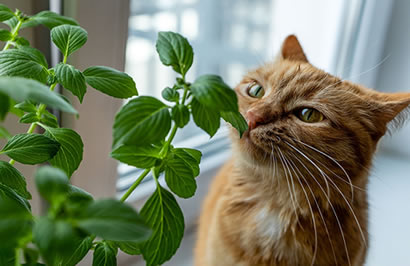
My cats hate my incense sticks even when they are unlit.
So, when one of my cats take a liking to a particular plant I will place a few incense sticks close to the plant in addition to spraying the leaves with safe oils.
Oils that are safe for both your plant foliage and your cats (but that cats hate) include, lemongrass, peppermint, citrus oils, lavender, cedarwood, eucalyptus, and neem oil.
As all my cats hate the scent of neem oil it tends to be my go-to oil of choice. I dap a little on both sides of the leaves.
I prefer neem oil because it not only stops my cats from ingesting potentially harmful substances but it also helps repel the type of insects that attack dracaena roots.
Neem oil is great for repelling insects that often lead to a drooping of the leaves, root rot or even the dracaena dying.
The toxic relationship between dogs and dracaena
The dog is Man’s best friend they say. So, its fairly clear why dogs are by far the most common pet in all parts of the western world, not just the US.
It is therefore important to know if dracaena is toxic, or even fatal, to canines if you have or intend to grow one. Can dracaena kill dogs?
Dracaena is toxic to dogs.
Fortunately ingesting dracaena is unlikely to kill your dog unless consumed in very large quantities in a short period of time.
A dog who has eaten dracaena and is displaying signs of poisoning such as vomiting, lack of appetite, depression or hypersalivation should be brought to a vet immediately.
Even though ingesting dracaena is rarely fatal for a dog it does cause some serious illness.
If you suspect your dog has eaten dracaena you must take immediate action.
Oh no! My dog ate dracaena
What should you do if your dog has ate dracaena?
If your dog has ate dracaena and is displaying signs of poisoning such as vomiting, loss of appetite, depression or hypersalivation you should bring it to a vet immediately.
Although only ingestion of large quantities is usually fatal, your dog will still need veterinary care as the symptoms of dracaena poisoning are quite severe and serious.
If you have identified that your dog has eaten your dracaena, and only after it has received treatment, you must ensure the same thing does not happen again.
Animals do not always associate illness with their own actions and your dog could repeat this behavior again.
So what can you do to ensure your dog stays away from your dracaena plant (and any other plants you have)?
How to keep dogs away from plants
The process for keeping a dog away from your dracaena, or any other plant that may be harmful for it or that it just wants to dig up, is the same as for cats.
To keep dogs away from plants spray the foliage with a strong scented oil that is safe for both animals and your plant.
This will deter the dog from eating the foliage.
You can also sprinkle dry citrus skin around the base of the pot to deter canines from digging up the soil.
Safe use oils to use on your plant, which are safe for both plant and dog, are lemongrass, peppermint, citrus oils, lavender, cedarwood and eucalyptus.
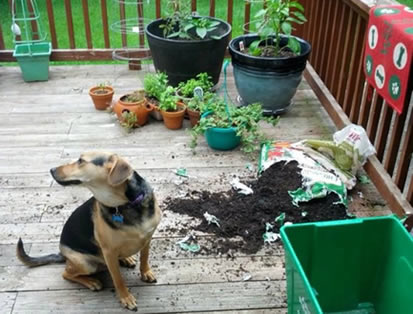
Just like I use neem oil for repelling my cats from houseplants you can also use it on the foliage of plants to deter your canine friends from approaching them.
This works for both indoor and outdoor plants.
Many people question the use of neem oil as a dog deterrent because this substance is often used to clean a dog’s coat and to repel ticks, lice and fleas.
But, the neem oil used on dog coats is very diluted compared to the pure neem oil you should use on your plant foliage.
And, even though coat-cleaning neem oil is diluted, most dogs still hate it.
Dracaena is not toxic to rabbits but too much isn’t good for them
Rabbits are also a popular pet, especially with children. So, as you wouldn’t want a child’s little friend to fall foul of a poisonous plant you’ll no doubt want to know; is dracaena toxic to rabbits?
Dracaena is not overly toxic to rabbits when consumed, though large quantities of it can cause digestive issues.
To stay on the safe side it is best to avoid feeding your rabbit dracaena exclusively and to ensure it has varied dietary sources of food especially if it roams in a yard with garden dracaena growing in it.
Rabbits rarely get sick from dracaena though it is not advisable to feed them large quantities of it.
Dracaena is difficult to digest and if it is all your rabbit is eating then the rabbit will develop digestive problems.
It is better to plan the diet for your rabbit so it has well balanced meals.
You can include dracaena leaves as part of the diet.
Birds can happily eat dracaena
Many people have pets birds, such as parrots, or they encourage birds to feed and nest in their yards.
If you keep birds, or attracts birds to your property outdoors, you will want to know if it’s a good idea to cultivate dracaena. Is dracaena safe for birds?
Dracaena is not toxic to birds. Dracaena is safe for domesticated and wild birds.
Only a small percentage of birds eat foliage and those that do can eat dracaena and experience no ill-effects.
Reptiles suffer no ill effects from munching on dracaena
What if you own a bearded dragon or similar small reptile … can you feed it dracaena leaves?
Dracaena is not toxic to reptiles. All reptile species can eat dracaena safely.
Do not fed the reptile on dracaena only but make sure it has a balanced diet.
Of course just because dracaena is safe for reptiles that doesn’t mean it should constitute the majority of its diet.
Be sure to feed your reptile a well balanced diet of fruit and veg as well as vegetation and not just dracaena.
The lemon lime plant is poisonous to some species
Lemon lime, dracaena fragrans, is a very popular dracaena houseplant.
In fact, it is so popular we have an article showing how to make dracaena lemon lime bushier and fuller, but is it poisonous?
The lemon lime plant belongs to the genus of plant called dracaena and, like all dracaena, it is non-poisonous to humans, birds, rabbits and reptiles.
However, a lemon lime plant is poisonous to felines, dogs and horses.
If you have curious kids roaming your home then you have no need to worry if they nibble on dracaena lemon lime leaves. They will suffer no ill-effects.
Your cat or dog will not be that lucky.
Ingesting any part of a lemon lime plant can cause vomiting (which can include traces of blood), anxiety, loss of appetite and hypersalivation in cats and dogs.
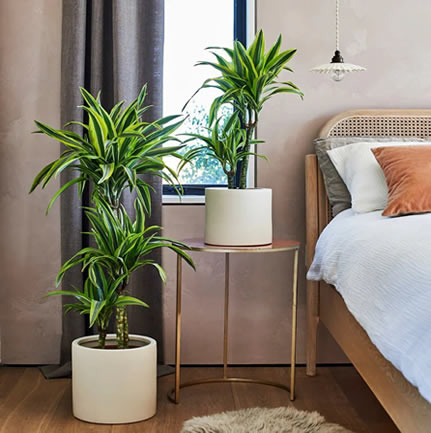
Any animal that displays these symptoms should be given immediate veterinary care.
If you own a rabbit or reptile dracaena should be ok to include as part of a well balanced diet.
Dracaena lemon lime toxicity levels for felines
We have seen that dracaena is highly poisonous to many different species so is the lemon lime toxic to cats?
The dracaena lemon lime plant is highly toxic to cats.
Ingesting it can cause serious symptoms that may include vomiting (sometimes with blood), anxiety, depression, prolonged loss of appetite and hypersalivation.
In large quantities, ingesting dracaena can be fatal to felines.
Lemon lime belongs to the genus of plants dracaena, all of which are toxic to cats.
If you suspect your cat has eaten dracaena and it is displaying any of the aforementioned symptoms take it to a vet immediately.
Dracaena lemon lime is poisonous to dogs
If lemon lime is toxic to cats is it also toxic to dogs?
Lemon lime is toxic to dogs and ingesting it can cause serious symptoms such as vomiting (sometimes this includes blood), depression, anxiety, anorexia and hypersalivation.
Lemon lime belongs to the genus of plants called dracaena, all of which are toxic to dogs.
If a large enough quantity is ingested it could be fatal for a canine.
If you suspect your dog has eaten dracaena and it is displaying any of the aforementioned symptoms take it to a vet immediately.

